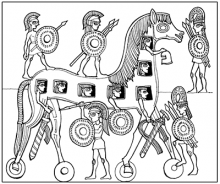
You are here
Episode 12: Odysseus Takes Charge
Story summary
Teaching activities
- Starting points
- Follow-up
- Further activities
-
Give the titles only of each episode to small groups to arrange in the correct order. Each group should report back to the whole class, who can discuss the ordering of the events that have lead up to this point in the story. This will help refresh their memories and remind them of the human cost of this war.
-
Again, working in groups, hand out all the episode summaries up to, and including Episode 11. Ask them to name individual characters who have died so far. (Cygnus, Patroclus, Hector, Achilles.) Make a class list and add to this at the end of the story.
Now that you have heard the complete story, you may prefer to discuss this last episode in relation to what has gone before, coming back to the episode-specific questions later. Because it seems more appropriate to discuss many of these important questions immediately after the story ends, they appear at the beginning of the suggestions below, rather than at the end (as in previous episodes).
-
The war lasted ten years and caused dreadful suffering and loss of life. The beautiful city of Troy was destroyed. Do they think it was worth the struggle and the pain? If they had been there, what would they have done as Greeks, or as Trojans?
-
What does Odysseus mean by “this business will end just the way it began” (
![[pdf] [pdf]](/sites/default/files/pdf_icon.png) transcript p. 1). (The war will end, as it began, with a horse. Odysseus is referring to the butchered stallion, mentioned in Episode 2, on which Helen’s suitors swore their oath; and to the horse he will build to outwit the Trojans.)
transcript p. 1). (The war will end, as it began, with a horse. Odysseus is referring to the butchered stallion, mentioned in Episode 2, on which Helen’s suitors swore their oath; and to the horse he will build to outwit the Trojans.) -
Is it possible for someone to feel jealousy for ten years?
-
Ask the class to imagine the conversation between Athene and Hera as they witness the murder of Paris. Write this as a dialogue between the two goddesses.
-
Write a monologue for Aphrodite as she watches Paris die. Paris chose her over the other two Hera and Athene: so is all this suffering her fault?
-
What does Aphrodite do to make things better? (She pulls the arrow from Helen’s heart.) Could she have done this earlier? If so, why didn’t she? What difference would it have made?
-
How did the Greeks behave? How does Odysseus think the Greek have behaved? (Odysseus is appalled and thinks that they have gone mad.)
-
Discuss Andromache’s fate. (She has lost her parents, her brothers, her husband, her baby son, her brother-in-law, her father-in-law; and now she and her mother-in-law are taken off as slaves.)
-
Show the class a copy of Picasso’s painting, Guernica. Discuss their response to this and the possible reasons why Picasso painted it. (It was his horror of events in the Spanish Civil War.)
-
Give out transcripts of two episodes of the story, to each of six groups. Ask the groups to read their episodes carefully, to find striking visual images. Use these as the stimulus for paintings/drawings of War with Troy, based on Picasso’s painting Guernica. Ask them to think of different titles for their works.
-
Display paintings/drawings and use them as a stimulus for retelling the story to children or adults.
Visual aids
The wooden horse
Based on a clay relief storage vessel, c. 670-650 BC. Mykonos Museum.
With naïve simplicity the artist shows the wooden horse brimming with soldiers ready to spring out and slaughter the Trojans once the horse has been dragged inside the walls of Troy. The horse is already equipped with wheels to make the process easier.
